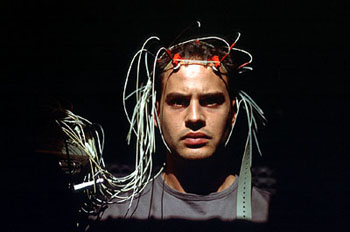![[Metroactive Movies]](/movies/gifs/movies468.gif)
[ Movies Index | Show Times | Silicon Valley | Metroactive Home | Archives ]
 The Future of Hair Extensions: Mortiz Bleibtreu is way too plugged in as one of the subjects of 'Das Experiment.' Slammer 'Das Experiment' is a grueling fictitious version of an infamous bit of local history IN 1971, SCIENTISTS at Stanford conducted a now infamous experiment. A selected group of strangers were divided into "prisoners" and "guards" in a simulated jail underneath the department of psychology. Though the experiment had been planned to run for two weeks, it ceased after six days because of abuses by the "guards." (The story is fictionalized in Mario Giordano's novel Black Box; a personal account is available online at http://www.prisonexp.org). Seems like a lot of effort just to prove that Stanford students have an evil authoritarian streak, just waiting to be revealed, when a quick walk down University Avenue demonstrates that point well enough. Go, UC! For a time, the German film Das Experiment follows the particulars of the Stanford experiment. As in real life, the prisoners are deloused, given smocks to wear and kept three to a cell. Our hero is the numbed taxi driver Tarek (Moritz Bleibtreu, the robber boyfriend in Run Lola Run). This sensually lipped character, a petty Brando, rubs the guards the wrong way with his attitude. He's apparently Arab, though this fact never inflames the guards' prejudices. As in Sam Fuller's Shock Corridor, Tarek is actually a journalist infiltrating the experiment. An ex-reporter who burned out, he's making a comeback, equipped with a spy camera hidden in his spectacles. Director Oliver Hirschbiegel has the Nicolas Roeg bug in a large way, darting to and fro into seemingly unrelated, unsequential images (shoes walking across the floor, rain on a windshield). The avant-garde frame is meant to defy this story's inherent claustrophobia, which is also the reason we return, again and yet again, to Dora, a girl with whom Tarek shared a one-night stand. She seemingly wasn't told Tarek is going to "prison" for two weeks, but she figures it out from envelopes she finds at his apartment (which she suddenly has access to). As Dora, Maren Eggert has to carry her scenes by looking at the camera and blank-facedly projecting the idea "I miss that man of mine." This film could have used the shading that Fuller would have given it, the sense that the reporter is perhaps skewing the situation to get a better story. This idea is suggested, then dropped. Das Experiment is most itself--and most repellent--when it turns into a standard prison picture, with a military officer (Christian Berkel) materializing to help our hero. When the guards turn into heavy-breathing rapists (Timo Dierkes hams it up as a sadist with an Elvis complex), Hirschbiegel amps up cinematic tension the easiest way possible. The film justifies itself as an important lesson: under the right circumstances anyone can turn fascist. Then the film turns the audience violent by cranking up the machinery of the basic thriller. It insinuates the question: When the bad men come, friend, are you going to be ready to fight for your life, your honor and your woman?
Das Experiment (Unrated; 113 min.), directed by Oliver Hirschbiegel, written by Mario Giordano, Christoph Darnstädt and Don Bohlinger, photographed by Raine Klausmann and starring Moritz Bleibtreu, opens Friday at the Towne Theater in San Jose.
Send a letter to the editor about this story to letters@metronews.com. [ Silicon Valley | Metroactive Home | Archives ]
|
From the September 26-October 2, 2002 issue of Metro, Silicon Valley's Weekly Newspaper.
Copyright © Metro Publishing Inc. Metroactive is affiliated with the Boulevards Network.
For more information about the San Jose/Silicon Valley area, visit sanjose.com.